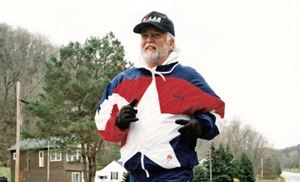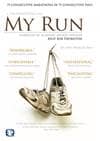
At 57 years old, Terry Hitchcock wasn’t what you’d call athletic. No one thought that his heart and joints could take endurance-testing activities. However, in 1996, he embarked on an adventure to run 75 marathons in 75 consecutive days. He got the idea from a Canadian man who lost his leg to cancer and did something extraordinary in 1980.
“He made a promise,” Terry tells Beliefnet. “He said, ‘If I ever get out of the hospital, I’m going to do something to give back,’ and his idea was to raise money [for] cancer research. He came up with the idea of running across Canada.”
That man, Terry Fox, ran more than 3,000 miles. Although Fox’s cancer spread and eventually took his life, he was an inspiration to millions, including Hitchcock.
“I kept thinking that someday maybe I can make a difference,” Terry says.
Years later, Terry was a family man with a wonderful wife named Sue. They had the classic American dream until a diagnosis of breast cancer shattered that dream. When Sue died, Terry was thrust into single parenthood – cooking, clothing and caring for his three young kids. Times were tough, and Terry’s eyes were opened to the plight of single parents. He had to do something.
“I knew that the Olympics were going to be held in Atlanta and two of my three children were born there,” he explains. “The Olympics represent going beyond and doing the impossible. I thought, ‘Well maybe what I could do is run toward Atlanta and maybe do the equivalent of at least a marathon a day. I think I’ll run to the opening ceremonies of the Olympics.’ Since I’m a dreamer, I could tell the story of what I’m doing and help raise awareness for single parents and their children.”
Terry was a weekend runner at best, getting in a few miles on Saturday. At his age, the thought of running 26.2 miles every day for more than two months was not only seemingly implausible… it was downright dangerous.
“No runner that I ever met said that I could do this,” Terry says. “They would say it was humanly impossible. Every doctor said, ‘You just can’t do this,’ because while I was training, I had a heart attack halfway through. My cardiologist said, ‘Don’t do this. You won’t live to tell your story.’ So all those things were against me, but I just felt with my own faith that this was something I should do – that when I completed it, it’s a story for the ages.’”
Despite the odds, Terry hit the streets running with a small team of friends and family. Soon enough he realized just how difficult the journey would be.
“First of all, the pounding that you put your body through is incredible. Halfway down to Atlanta, both my ankles were fractured and my left kneecap also had a fracture. I was in pain every day and just had to learn to bear it and run above it.”
Worst yet, after 30 days of running, his team began to disband. “Five of the six said, ‘We’re going to go home,’ because it wasn’t fun. It was very hard work. They were young and they missed their friends. The 31st day I’m standing on the side of the road with a trailer going home, and beside me is my oldest son Christian. He is looking at me saying, ‘Dad, I’m not going to leave you.’ It seemed like Chris and I against the world.”
The father and son team had to figure out how to keep Terry fed and hydrated on a regular schedule and find places to sleep along the way. Terry recalls, “It was a challenge, but it was also like the daily marathons we all run. Every day is a challenge and you have to figure it out and you have to pick your stuff up and keep going.”
Terry drew a lot of inspiration from his time on the road. He was also inspiring to others. He says, “I would see children everyday. They’d come up to me and hug me. Moms would have tears in their eyes, and men would shake my hand. I truly saw the heartbeat of this country; it can be very tough out there. They would come up to me and say, ‘You saved my life. If you can do that, I now think maybe I can get through my days too.’”
Terry’s run to Atlanta became the subject of a documentary by director and producer Tim Vandesteeg called My Run. Tim says that putting Terry’s story together was an inspiration for him as well.
“I’ve taken away a clearer vision of who I am, what I am about and what do I want to leave,” he says. For Tim as a filmmaker, the need to produce and direct quality movies with substance is strong and the filmmaking process can take time. He adds, “It takes two, three years for an indie filmmaker to make a film, sometimes more than that. You want to make sure it’s worth the effort. I got the rights to My Run in 2004, and it’s coming out on DVD in 2011 here. Seven years. Was it worth the effort? I’d say absolutely.”
Terry too sees the fruits of his labor. Today, he speaks to audiences everywhere from classrooms to jailhouses. When asked how he knows he’s reached people and been a success, he says, “I count the number of hugs.”
He continues, “It’s a film about the daily marathons that we all run every single day. It’s a story about faith and endurance. Nothing is impossible. Throughout my whole life I have done numerous things and it all started with someone saying, ‘Well, you can’t do that. No one’s been able to do that.’ Before that, my grandfather said to me every single day, ‘Remember, Terry, there will be nothing in life that you can’t accomplish.’ I’ve always had that theme in my life.
“It’s not about this guy who attempted to run these marathons. It’s really an ageless story about somebody who is trying to show other people that they can get through their own daily marathon.”

Purchase My Run. A portion of proceeds from DVD sales goes to Live Strong to Fight Cancer.

